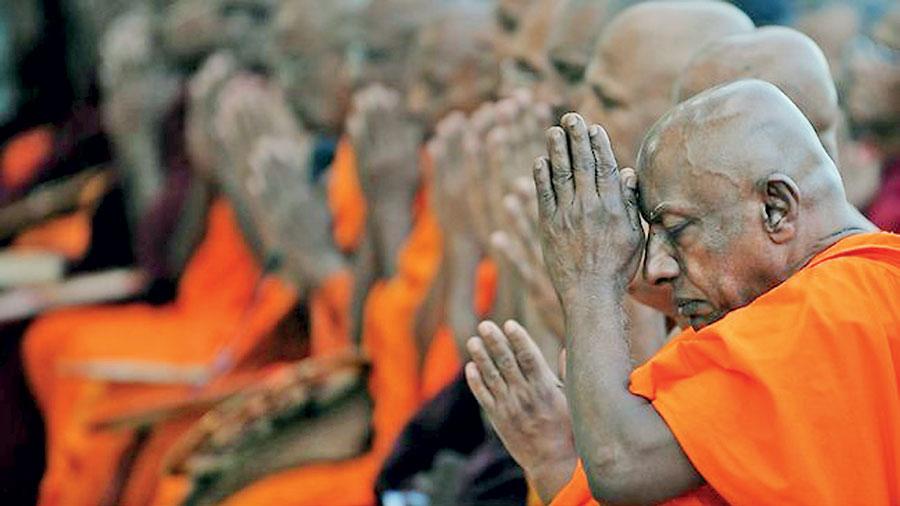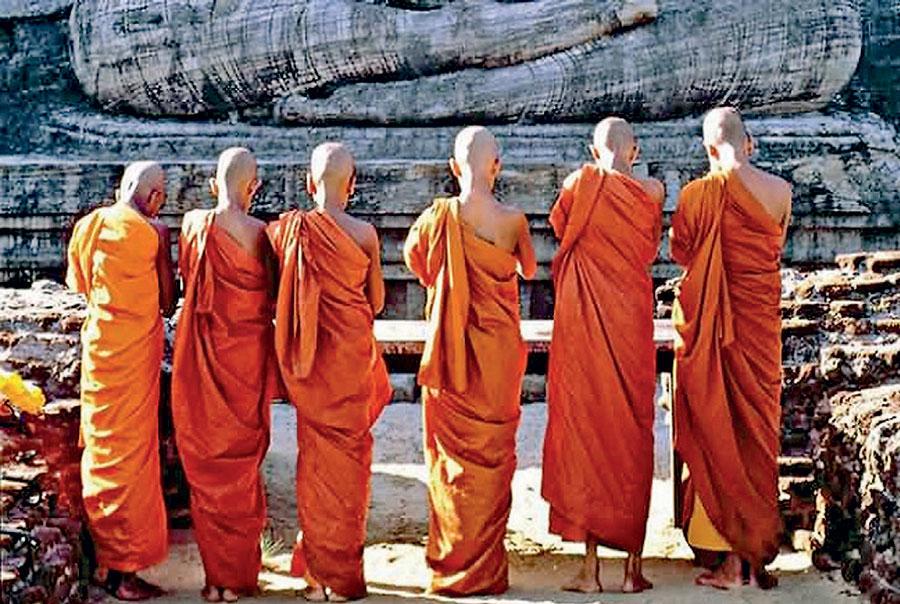Reply To:
Name - Reply Comment

There are many fruits that can be experienced by leading the homeless life preached by Gautama Buddha
Finally l went up to Sanjaya Bellattiputta who answered my question by total evasion
Elimination of the pervasive notions of ‘I’ and ‘Me’ is a prerequisite
 n a night of the full moon, King Ajasatta, with the medic Jeevaka, five hundred princesses and numerous ministers arrived at Veluwanaramaya to direct a memorable question at Gautama Buddha. “Buddha,” he said, “ Men in this world master various trades and professions and enjoy the fruits of their skills. They engage in a multitude of meritorious acts that produce a gratifying after-life. Can you indicate whether such a reward is visible here and now, as a fruit of the homeless life that you espouse in your teaching? “
n a night of the full moon, King Ajasatta, with the medic Jeevaka, five hundred princesses and numerous ministers arrived at Veluwanaramaya to direct a memorable question at Gautama Buddha. “Buddha,” he said, “ Men in this world master various trades and professions and enjoy the fruits of their skills. They engage in a multitude of meritorious acts that produce a gratifying after-life. Can you indicate whether such a reward is visible here and now, as a fruit of the homeless life that you espouse in your teaching? “
“ Great King, do you remember asking this question from other ascetics, as well ? “ queried Buddha.
Having confessed he did, the king proceeded to lay bare a thoroughly jumbled world of nihilists, eternists, finitists, infinitists, materialists, rationalists and the like that thrived before Gautama Buddha made his appearance in India.
He said that the first teacher he visited, Purana Kassapa propounded the theory that if one were to lie in ambush, commit robbery and carry off booty, commit adultery, utter falsities or were to pace down the bank of river Ganges slaying anyone and everyone that he comes across, or he were to make this earth one heap of flesh with a razor-sharp weapon, yet no evil would accrue to him. Equally, no merit would accrue to anyone from liberality, self-control, abstinence or speaking the truth - the theory of non-action. “Buddha, it is as if a man being asked about a mango, describes a breadfruit tree or being asked about a breadfruit, talks about a mango tree, “ quipped the king. He continued, “ Buddha, no one would approve of a king who speaks despitefully of a preacher in his own kingdom, so l got up and left without saying a word, thoroughly disillusioned.”
The king then visited Makkali Gosala. He preached there was no cause nor condition for defilement or purification of beings. All creatures live without power or control over themselves and experience pleasure and pain through several cycles of birth. All men, wise and foolish run around for eight million four hundred thousand eons when they finally bring an end to all their suffering. There is nothing such as discipline, austerity or holy life since pleasure and pain have been measured out for them, so just as a tossed ball of twine keeps rolling till it unwinds itself, fools and the wise circle around until they exhaust their destiny.
The third to be visited, he said, was Ajitha Kesakambala who covered himself with a garment made of human hair. “ Buddha, when l asked about the fruits... he explained there is no donation or ritual in the world, no effects of good or evil deed, no life here or hereafter, no mother or father, only a mass of the four great elements that finally reverts to earth, water, fire and air. He said the manifestations of good and evil are mere creations of fools for whom, along with the wise, there is nothing called rebirth - the theory of annihilation. So, Lord, l left him the way l did the ones before him.”
The king thereafter called on Pakuda Kachchayana. He had propounded the theory that the world is entirely constituted of seven imperturbable factors, uncreated, frigid, stable as a column - the four great elements plus pleasure and pain and the life factor. There is absolutely nothing beyond. If one were to cut off a man’s head with a sword, its a mere insertion of the blade through the intervenient space between the above seven elements. The king said he got up and left as before with no comments being made.
“ Thereafter, Lord, when l asked the ascetic Nigantaputta of fruits of the homeless life, he explained the fourfold restraint to me, abstinence from the use of cold water for fear of destroying living organisms in it, abstinence from all evil deeds, restrained conduct in all aspects and and washing away one’s sins in flowing water.
Finally l went up to Sanjaya Bellattiputta who answered my question by total evasion. He would neither admit nor deny life after death, neither existence nor non-existence of reward and retribution nor another word. Of all the ascetics and Brahmins l met, l thought he was by far the most stupid and confused. Now, l ask the Blessed Buddha, like those men of the world who enjoy the fruits of their labour, is there such a reward visible here and now in living the homeless life you preach? “
Using ‘Samangnapala Sutta’ Buddha then delivered in reply to the king the final statement on the corpus of priesthood with it’s unsurpassed rewards visible right now, here and hereafter.
He commenced by drawing the analogy of a king’s slave who, impressed by the freedom in renunciation, dons the yellow robe to live the holy life, dwelling in restraint of body, speech and thought, surviving on a modicum of food, totally content with his life of solitude. “Now, would you ever summon that bhikkhu to be your slave again?” asked the Blessed One.
“Certainly not, Buddha, l would go down to pay homage to him and make necessary arrangements for his protection.” “Now, Great King, that is the first fruit of the homeless life” said Buddha.
“Likewise, if a rate - paying farmer under you disillusioned with the householder’s life goes into homelessness and lives the exemplary life of the bhikkhu, would you recall him to his farming practice and demand that he pay his rates?” “Certainly not, Buddha, as in the case of the previous bhikkhu l would provide him with all requisites.” “That, Great King, is the reward of the homeless life l extol”.
“Then there arises a Fully Enlightened Buddha who preaches a Dhamma that is lovely in it’s beginning, lovely in the middle and lovely in the ending, in the spirit and in the letter. A householder tired of the dusty and cramped life on hearing the Dhamma enters the homeless world as clean and pure as the fresh air, develops restraint of the five faculties, banishes the five hindrances and begins to experience the blameless bliss of the first jhana arising from gladness, delight, tranquility, joy and concentration, influenced by thinking and pondering...... now that is the third fruit of the homeless life
“The second jhana born of concentration and filled with delight and joy, but sans thinking and pondering.... that is the fourth fruit of the homeless life “Then, Great King, he enters the third jhana more excellent than the previous ones, which Aryans call ‘the state of equanimity and mindfulness’.... the fifth fruit....The bhikkhu thereafter, abandoning both pleasure and pain and with the disappearance of happiness and sadness, goes beyond to enter the fourth jhana of equanimity per se, suffusing his entire body with a mental purity hitherto not experienced by him.
“With a malleable, workable and imperturbable mind thus acquired, he turns to insight mindfulness of the total comprehension of this corporeal body made up of the four great elements, born of mother and father, kept alive on rice and gruel, liable to disintegration but kept intact on a ‘consciousness’ dependent on and bound in turn with that corporeal body. This fruit, the seventh of homeless life is more refined and excellent than the former
“He then directs the mind towards the creation of a mind-made body perfect and complete in all its limbs and other features and faculties. This is the eighth fruit....
“Thereafter, if he so wishes, turns towards the various supernormal powers. The ninth fruit of the homeless life, it is.
“With such a concentrated mind, he directs it towards the divine ear (dibbhu sotha) far surpassing that of the human, capable of hearing the sounds and voices of other worlds. The tenth fruit....He then applies his mind to determine the minds of others. The eleventh fruit....
“ If he so wishes, with a cleansed and concentrated mind he turns towards his previous existences of one, two, hundreds, thousands, hundred thousands, several periods of contractions and expansions. This is the twelfth reward of the homeless life....
“And with a mind so developed he applies and directs it to the divine ear (dibbhu chakka) where he sees beings passing away and arising in happy or unhappy destinations on account of their good or evil kammic acts, proper or improper conduct of body, speech and thought, their praising of, or disparaging the Noble Ones and on account of their holding right views or wrong views. - the fourteenth reward....
“Finally, with that workable and established mind he turns towards the destruction of the corruptibles, the cause of the fathomless journey. He comprehends suffering, it’s origin, it’s cessation and the path to it. There is no fruit more excellent and perfect than this”
“Excellent, Buddha, excellent, a light was brought to a dark room so that those with eyes could see what’s in it.... Dhamma was expounded in many ways. Lord, l go for refuge to the Blessed One, the Dhamma and Sangha. May the Blessed Lord accept me as a lay follower as long as my life lasts” pleaded King Ajasattu.
However the sermon was of no benefit to the king in that birth, he had committed the unforgivable crime of patricide sometime before. After burning in dreaded ‘ lokumbu niraya ‘ for sixty thousand years he will emerge to be a Pachcheka Buddha by the name of Viditha Visesa, declared Gautama Buddha.
The sublime doctrine devoid of parables but constituting abstruse phenomena as anatta, kamma and rebirth is obviously to be grasped through an intuitive / rationalist process enunciated by a Fully Enlightened Buddha. Elimination of the pervasive notions of ‘I’ and ‘Me’ is a prerequisite as laid down in the path, though their residual traces are said to disappear at Arahanthood.
‘Watch them tremble like fish in the receding floods. Having shed one’s ego he stands free of all existence’ said Guhattaka Sutta of Khuddaka Mikayla.
